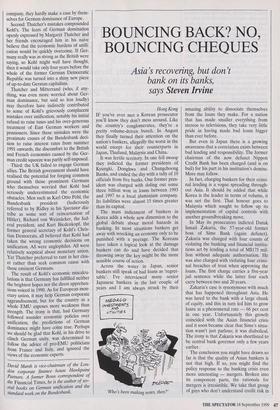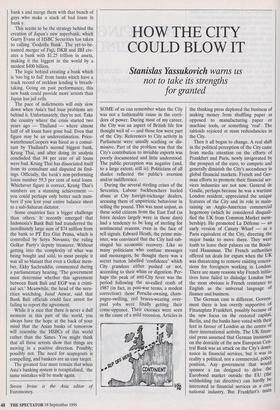BOUNCING BACK? NO, BOUNCING CHEQUES
Asia's recovering, but don't bank on its banks,
says Steven Irvine Hong Kong IF you've ever met a Korean prosecutor you'll know they don't mess around. Like the country's conglomerates, they're a pretty volume-driven bunch. In August they finally turned their attention on the nation's bankers, allegedly the worst in the world except for their counterparts in Japan, Thailand, Malaysia and China.
It was fertile territory. In one fell swoop they indicted the former presidents of Kyungki, Donghwa and Chungchoong Banks, and ended the day with a tally of 19 officials from five banks. One former pres- ident was charged with doling out some three billion won in loans between 1993 and 1997 to a local aluminium company. Its liabilities were almost 15 times greater than its capital.
The mass indictment of bankers in Korea adds a whole new dimension to the global debate about moral hazards in banking. In most situations bankers get away with wrecking an economy only to be punished with a peerage. The Koreans have taken a logical look at the damage bankers can do and have decided that throwing away the key might be the more sensible course of action.
Across the water in Japan, senior bankers still speak of bad loans as 'regret- table'. I've interviewed many senior Japanese bankers in the last couple of years and I am always struck by their `Who's been making notes, then?' amazing ability to dissociate themselves from the loans they make. For a nation that has made smaller everything from stereos to televisions, they take very little pride in having made bad loans bigger than ever before.
But even in Japan there is a growing awareness that a correlation exists between bad lending and responsibility. The former chairman of the now defunct Nippon Credit Bank has been charged (and is on bail) for his part in his institution's demise. More may follow.
In fact, charging bankers for their crimi- nal lending is a vogue spreading through- out Asia. It should be added that while Korea is the leader in terms of volume, it was not the first. That honour goes to Malaysia which sought to follow up its implementation of capital controls with another groundbreaking move.
In May its prosecutors indicted Datuk Ismail Zakaria, the 57-year-old former boss of Sime Bank (again defunct). Zakaria was charged with four counts of violating the banking and financial institu- tions act by lending a total of M$175 mil- lion without adequate authorisation. He was also charged with violating four crimi- nal breaches of trust when approving the loans. The first charge carries a five-year jail sentence while the latter four each carry between two and 20 years.
Zakaria's case is synonymous with much that has happened throughout Asia. He was lured to the bank with a large chunk of equity, and this in turn led him to grow loans at a phenomenal rate — 66 per cent in one year. Unfortunately this growth coincided with the Asian financial crisis and it soon became clear that Sime's situa- tion wasn't just parlous; it was diabolical. The irony is that Zakaria was shortlisted to be central bank governor only a few years earlier.
The conclusion you might have drawn so far is that the quality of Asian bankers is not that high. If so, you might find the policy response to the banking crisis even more interesting — mergers. Broken into its component parts, the rationale for mergers is irresistible. We take that group of guys who don't understand credit risk in bank x and merge them with that bunch of guys who make a stack of bad loans in bank y.
This seems to be the strategy behind the creation of Japan's new superbank, which Garry Evans of HSBC Securities has taken to calling `Godzilla Bank'. The yet-to-be- named merger of Fuji, DKB and IBJ cre- ates a bank with $1.25 trillion in assets, making it the biggest in the world by a modest $400 billion.
The logic behind creating a bank which is 'too big to fail' from banks which have a track record of reckless lending is breath- taking. Going on past performance, this new bank could provide more arrests than Japan has jail cells.
The pace of indictments will only slow down when Asia's bad loan problems are behind it. Unfortunately, they're not. Take the country where the crisis started two years ago — Thailand — where almost half of all loans have gone bad. Even that figure may be an underestimation. Price- waterhouseCoopers was hired as a consul- tant by Thailand's second biggest bank, Krung Thai, and after doing its analysis concluded that 84 per cent of all loans were bad. Krung Thai has dissociated itself from its consultant and disputed its find- ings. Officially, the bank's non-performing loans number 59.3 per cent of total loans. Whichever figure is correct, Krung Thai's numbers are a stunning achievement you could perhaps only better such num- bers if you lent your entire balance sheet to a sub-Saharan dictator.
Some countries face a bigger challenge than others. It recently emerged that Indonesia's Bank Bali had transferred the inordinately large sum of $74 million from the bank to PT Era Giat Prima, which is controlled by Setya Novanto, the ruling Golkar Party's deputy treasurer. Without getting into the complexity of what was being bought and sold, to most people it was all so blatant that even a Golkar mem- ber, Ekky Sachruddin, commented during a parliamentary hearing, 'The government must determine whether this agreement between Bank Bali and EGP was a crimi- nal act.' Meanwhile, the head of the secu- rities watchdog, Jusuf Anwar, said that Bank Bali officials could face arrest for failing to report the agreement.
While it is nice that there is never a dull moment in this part of the world, you always have the hope at the back of your mind that the Asian banks of tomorrow will resemble the HSBCs of this world rather than the Simes. You might think that all these arrests show that things are moving in a positive direction. Possibly; possibly not. The need for scapegoats is compelling, and bankers are an easy target.
The greatest fear must remain that when Asia's banking system is recapitalised, the same mistakes will be made again.
Steven Irvine is the Asia editor of Euromoney.



























































































 Previous page
Previous page